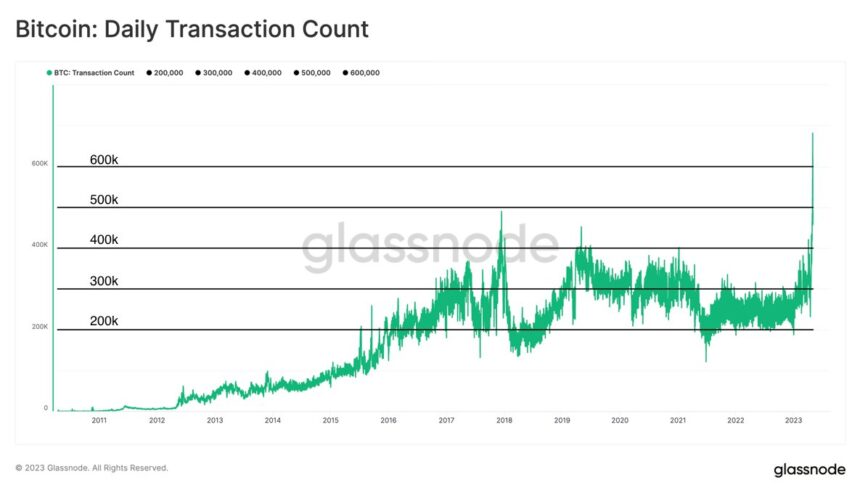The number of daily Bitcoin (BTC) transactions on the blockchain has increased, reaching an all-time high of 682,000 on May 1. Rafael Schultze-Kraft, one of the founders of Glassnode, has suggested that this increase in transaction volume is likely due to a combination of factors.
Bitcoin transactions skyrocket
Rafael argues that a major driver is the growing adoption of Bitcoin by institutional investors and large corporations. As more companies begin to hold Bitcoin on their balance sheets and offer it as a payment option, the demand for Bitcoin transactions may increase.
Another factor contributing to the surge in Bitcoin transactions is the growing popularity of decentralized finance (DeFi) applications. Built on top of blockchains such as Ethereum and Bitcoin, these applications allow users to borrow, lend and trade cryptocurrencies in a decentralized manner.
Furthermore, Schultze-Kraft notes that the recent surge in Bitcoin transactions could be a sign of increased interest and activity in the broader cryptocurrency space. As more people become aware of Bitcoin and other cryptocurrencies.

In addition, according to Schultze-Kraft, the current increase in the number of transactions is notable because it is more than double the baseline established in 2022, which was relatively stable at about 250,000 transactions per day, as shown in the chart above.
A notable increase in Taproot transaction usage accompanied the recent surge. According to data from Glassnode, Taproot transactions accounted for 37.5% of output spent on April 30, and on May 1, a record-breaking 60% of all Bitcoin transactions using Taproot.

So, what is Taproot and why is its adoption increasing? Taproot is a proposed Bitcoin network upgrade designed to improve privacy and efficiency. It achieves this by combining multiple BTC script paths into a single output that can be issued using a single signature. This makes transactions smaller and less expensive, which can help ease network congestion and lower rates.
Taproot was first proposed in 2018, but it took some time for the Bitcoin community to reach a consensus on its implementation. However, with Taproot’s recent activation looking more and more likely, more users and businesses are starting to adopt the technology.
In addition, the recent increase in Taproot transactions in the Bitcoin network can be attributed to the surge in text inscriptions, according to Rafael Schultze-Kraft. More than 50% of all transactions on the Bitcoin network are linked to text inscriptions.
When separating transactions involving text inscriptions from all other Bitcoin transactions, it becomes clear that they are the sole driver for the recent surge in BTC activity, surpassing the total number of all other transactions for a short while.

Glassnode’s data shows that text inscriptions are much more popular than others on the Bitcoin network, including images, videos, and audio. While there are some uses for these other types of inscriptions, such as embedding a digital signature or proof of ownership, text inscriptions seem to be the most versatile and widely used.
As the Bitcoin network continues to evolve and adapt to changing user needs, there are likely to be more innovations and upgrades that will further improve functionality and usability. Whether through text inscriptions or other technologies, it is clear that BTC is becoming more than just a financial tool, but also a powerful tool for communication and expression.
Featured image of Unsplash, chart from TradingView.com

